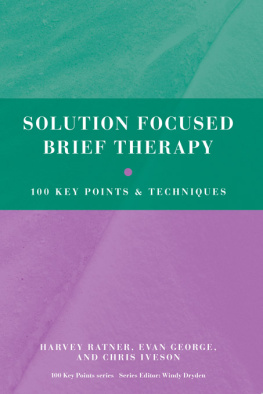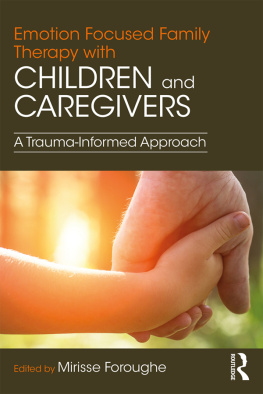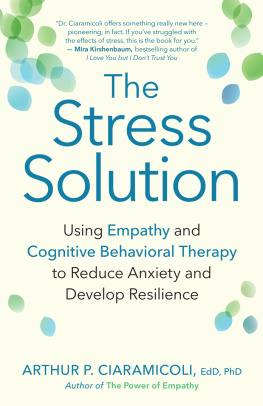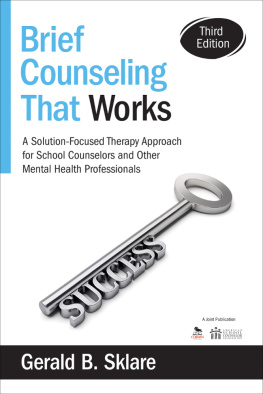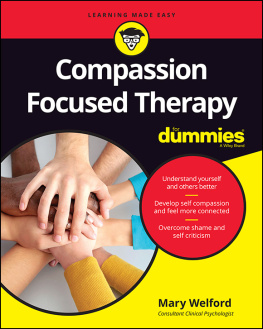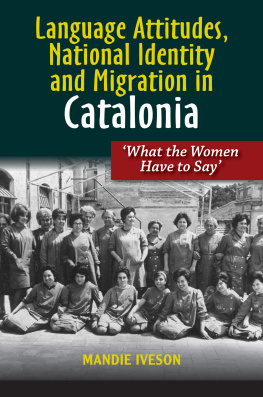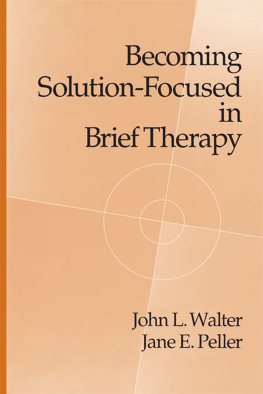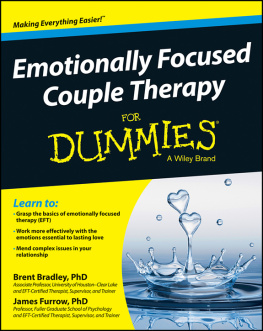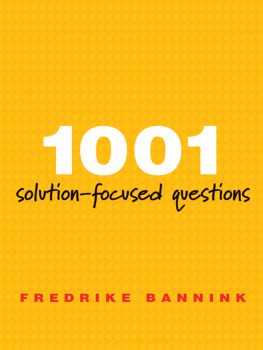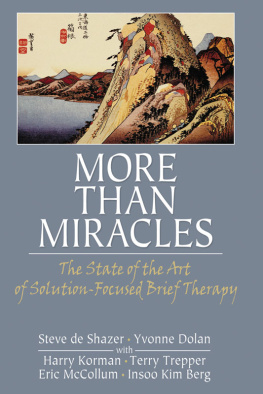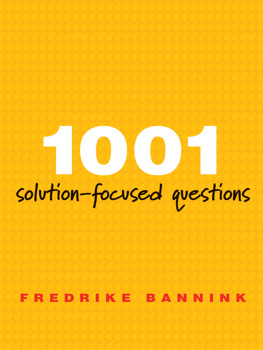Solution Focused Brief Therapy
Solution Focused Brief Therapy: 100 Key Points and Techniques provides a concise and jargon-free guide to the thinking and practice of this exciting approach which enables people to make changes in their lives quickly and effectively. It covers:
- the history and background to solution focused practice
- the philosophical underpinnings of the approach
- techniques and practices
- specific applications to work with children and adolescents (including schools-based work), families and adults
- how to deal with difficult situations
- organizational applications, including supervision, coaching, and leadership
- frequently asked questions
This book is an invaluable resource for all therapists and counsellors, whether in training or practice. It will also be essential for any professional whose job it is to help people make changes in their lives, and will therefore be of interest to social workers, probation officers, psychiatric staff, doctors, and teachers, as well as those working in organizations as coaches and managers.
Harvey Ratner, Evan George, and Chris Iveson founded BRIEF in London in 1989 as an independent training, therapy, coaching and consultation agency for the development of solution focused brief therapy.
100 Key Points
Series Editor: Windy Dryden
ALSO IN THIS SERIES:
Cognitive Therapy: 100 Key Points and Techniques
Michael Neenan and Windy Dryden
Rational Emotive Behaviour Therapy: 100 Key Points and Techniques
Windy Dryden and Michael Neenan
Family Therapy: 100 Key Points and Techniques
Mark Rivett and Eddy Street
Transactional Analysis: 100 Key Points and Techniques
Mark Widdowson
Person-Centred Therapy: 100 Key Points
Paul Wilkins
Gestalt Therapy: 100 Key Points and Techniques
Dave Mann
Integrative Therapy: 100 Key Points and Techniques
Maria Gilbert and Vanja Orlans
Solution Focused Brief Therapy: 100 Key Points and Techniques
Harvey Ratner, Evan George and Chris Iveson
Solution Focused Brief Therapy
100 Key Points and Techniques
Harvey Ratner, Evan George, and Chris Iveson
First published 2012
by Routledge
27 Church Road, Hove, East Sussex BN3 2FA
Simultaneously published in the USA and Canada
by Routledge
711 Third Avenue, New York, NY 10016
Routledge is an imprint of the Taylor & Francis Group, an Informa business
2012 Harvey Ratner, Evan George, and Chris Iveson
The right of Harvey Ratner, Evan George, and Chris Iveson to be identified as authors of this work has been asserted by the above mentioned authors in accordance with sections 77 and 78 of the Copyright, Designs and Patents Act 1988.
All rights reserved. No part of this book may be reprinted or reproduced or utilized in any form or by any electronic, mechanical, or other means, now known or hereafter invented, including photocopying and recording, or in any information storage or retrieval system, without permission in writing from the publishers.
Trademark notice: Product or corporate names may be trademarks or registered trademarks, and are used only for identification and explanation without intent to infringe.
British Library Cataloguing in Publication Data
A catalogue record for this book is available from the British Library
Library of Congress Cataloging in Publication Data
Solution focused brief therapy : 100 key points and techniques /
Harvey Ratner, Evan George, Chris Iveson.
p. cm. (100 key points)
ISBN 978-0-415-60612-7 (hardback) ISBN 978-0-415-60613-4
(paperback) 1. Solution focused brief therapy. I. Ratner,
Harvey. II. George, Evan, 1951 III. Iveson, Chris.
RC489.S65S64 2012
616.89147 dc23
2011048157
ISBN: 978-0-415-60613-4 (hbk)
ISBN: 978-0-415-60612-7 (pbk)
ISBN: 978-0-203-11656-2 (ebk)
Typeset in Times New Roman
by RefineCatch Ltd., Bungay, Suffolk
Contents
|
|
| 13 |
|
|
|
|
|
|
|
|
|
|
|
|
| Part 5 THE CLIENTS PREFERRED FUTURE |
|
|
|
|
|
|
|
|
|
|
|
|
| Part 9 ENDING SESSIONS |
|
|
|
|
|
|
|
|
|
|
|
|
|
|
|
| Part 14 WORK WITH ADULTS |
|
|
|
|
|
|
Preface
At the end of a third session at BRIEF during which the client had reported significant progress, the therapist asked whether any further sessions would be necessary. The client responded by saying:
I dont feel Im dependent on these meetings, which is a very good sign I think. I do feel Ive changed. I have taken away some ideas about how to approach things. Some of the work weve done: its very subtle, its shifted things and helped a lot, and yet it seems quite simple in some ways, which is really lovely. I suppose it proves the point that you only have to make sometimes quite small adjustments that can have a very large impact on things, which is nice. I do like the fact that while there is the space here to discuss the background to things, not going over past things is actually quite good because thats a bit of an indulgence, its quite nice to talk about the demons or whatever and sometimes that can help to take responsibility for the consequences of whatever, so Im not saying that that kind of counselling isnt valid I think it is but I also think if someones been traumatized they can be reliving that and that can almost make it worse in a way.
The client goes on to say how different the actual experience is from its description on BRIEFs website: a great deal more subtle.
So, in this book we will try to boil down Solution Focused Brief Therapy (SFBT) in a way that we hope will do justice to the richness of what is a subtle and intricate process. The solution focused approach is, undoubtedly, a radical approach, claiming that little or nothing needs to be known about the presenting problem (or what caused it) for the client to make good progress. Yet, at the end of the day, its just a form of conversation. Steve de Shazer, one of the founders of the approach, was fond of repeating the story of when a receptionist at the Brief Family Therapy Center (BFTC) in Milwaukee asked to watch a session to see what it was all about. After a few minutes she said oh, its all just a bunch of talk!, and went back to her desk in the reception area. But, as in the title of de Shazers last book, words were originally magic and a bunch of talk is what creates the world and makes it go round.
BRIEF was established in 1989 by the three authors, all of whom are from social work backgrounds and are accredited family therapists. BRIEF is a therapy, coaching, training, and consultancy centre (www.brief.org.uk) with the largest training programme for brief therapy in the world. In this book, we will illustrate the techniques and ideas with examples taken from our own practice, all of which are, of course, altered in such as way as to protect the anonymity of clients. We would like to acknowledge the contribution made in recent years to our thinking by our former colleagues Yasmin Ajmal and Guy Shennan.

